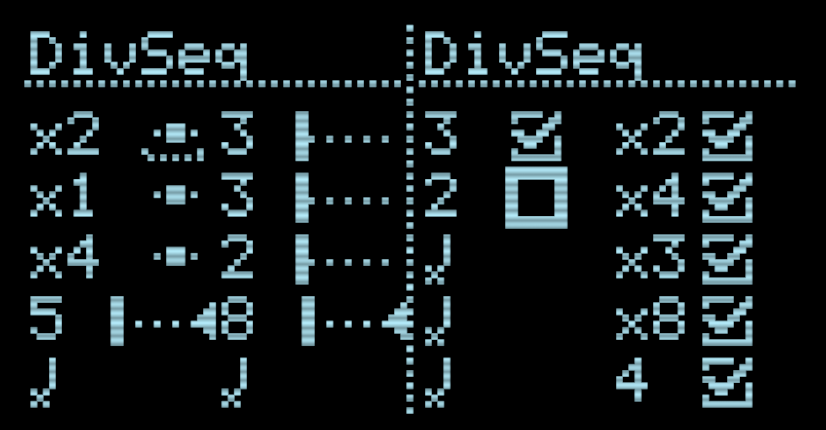DivSeq

DivSeq is a dual sequential clock divider with a single input clock. Each of the two channels is composed of a sequence of up to 5 clock dividers. Under normal operation, a step “n” triggers 1 clock pulse, skips n-1 pulses, and then steps to the next clock divider. Multipliers fire n triggers within 1 clock pulse and then advance.
Via the CV inputs, each channel may also be in inverted mode (skip 1, trigger n-1 pulses, step) with positive voltage, or cross-channel XOR mode with negative voltage. There is a virtual detent around 0v for normal mode.
Performance mutes may be manually toggled for each divider step. Each step may be set to a divider of 0 (off) up to 63.
I/O
| 1/3 | 2/4 | |
|---|---|---|
| TRIG | Clock | Reset |
| CV INs | Ch 1 mode: inverted (positive) XOR (negative) | Ch 2 mode: inverted XOR |
| OUTs | Ch 1 Trigger sequence | Ch 2 Trigger sequence |
UI Parameters
- Ch 1 divider value steps 1-5
- Ch 2 divider value steps 1-5
- Ch 1 performance mutes steps 1-5
- Ch 2 performance mutes steps 1-5
With a step highlighted for editing, the AuxButton action will also toggle mute.
Tips
The total length of the trigger pattern is the sum of all 5 steps (with any multipliers occupying just 1 step). For musical applications in standard 4/4 time signatures, you can get a regular repeating phrase as long as the steps add up to a power of two - 16, 32, or 64 work well. Similar results for 3/4 or 6/8 time if the steps add up to 12, 24, 48, etc.
A pattern of (28, x4, 2, 1) puts a little fill at the end of a 32-step phrase.
Use a single step set to “4” for a standard 4/4 kick. Send a positive gate into the CV input to invert the same pattern for a techno bassline.
Mute the first step to skip that many Clocks at the beginning after Reset - useful for offsetting a snare pattern.